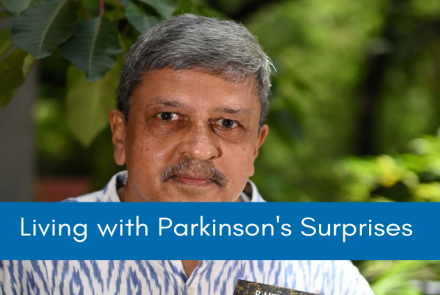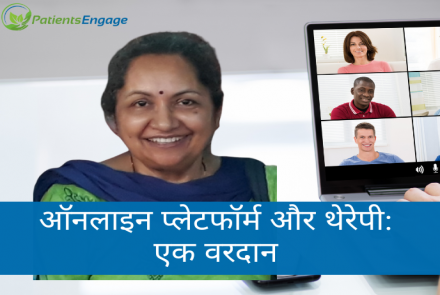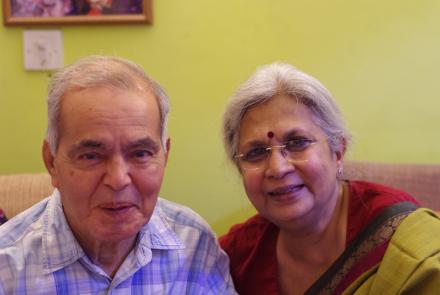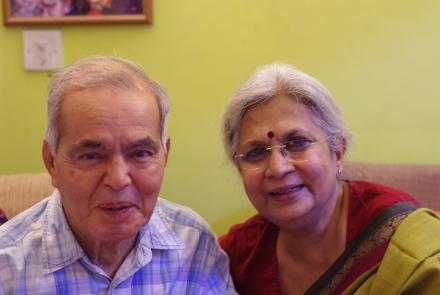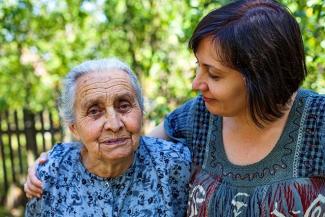
Taking care of a person with Parkinson’s is tough and it progressively gets tougher as the condition progresses. Samiksha Sivan, Clinical Psychologist, PDMDS talks about caregiver burnout and how a caregiver can take of herself/himself.
“It is extremely tough to see my husband, who was such a lively person become so dull and expressionless. I help him with most of his everyday tasks now and he seems to realise somewhere that he is dependent on me and he hates it! I worry a lot about what is going to happen as the disease progresses further but I’m ready to do whatever it takes to make him feel better.”
- a caregiver of a PwP from PDMDS (Dadar)
In most scenarios, caregiving is unconditional. It takes many forms and most times we don’t even realise that we are/were someone’s caregivers; as somebody’s wife, husband, son, daughter, mother, father or a friend. We realise we are helping our loved one, but we don’t think of ourselves as “caregivers”. We feel happy to be helping our loved one in need, but sometimes, when the demands are heavy, it becomes increasingly difficult and we may feel exhausted or stressed. We think that we should be able to handle any situation related to our loved one’s illness, on top of work and family schedules, that we are responsible for the same, but over time, our stamina wanes and we begin to feel guilty and depressed.
In small doses, these tasks are manageable easily. However, it becomes much more challenging where you need to juggle competing demands of caregiving and other family responsibilities, in an ongoing basis, it can become extremely taxing, emotionally and physically. Taking care of a person with Parkinson’s (PwP) is tougher than it may seem!
So, who are caregivers?
The answer is most of us, at some point in our lives! While some people rely on paid caregivers, most rely on family assistance. Caregivers have a wide range of responsibilities! For eg:
- Are you the person who helps your loved one have shower, get dressed and take medicine?
- Are you the person who helps your loved one in and out of bed, with physical therapy, medicines (injections, feeding tubes or other medical procedures)?
- Are you the person who spends time handling a crisis at work and making plans to take better care of your loved one?
If the answer to any one of these questions is yes, then you are a caregiver.
There are two types of caregivers:
Primary Caregivers: Those who primarily look after the person with Parkinson’s. For eg: wife/husband of PwP
Secondary Caregivers: Those who help the primary caregiver with household chores and other odd jobs related to the PwP. For eg: Other members of the family who are not directly involved in caregiving, but stay in the same house like son, daughter, daughter-in-law, etc.
What do I as a caregiver need to know?
Being able to cope with everyday tasks and the stresses of caregiving is an art in itself. In order to continue with our caregiving, it is important that we learn to care for ourselves as well. Why does this become so important?
Think about this: You are in an aeroplane which is in an emergency situation. The oxygen masks have dropped down because of low pressure/oxygen in your cabin. The air hostess announces, ‘Please put your own oxygen masks before helping anyone else.’ Remember, you are not being selfish by taking care of yourself first! You are ensuring that you can breathe properly, be conscious and are capable enough to help the person next to you. In the same scenario, if you rush to help others before helping yourself, you are going to be putting yourself and the other person in danger.
Apply this metaphor to you as a caregiver and your loved one as the one who needs caregiving.
Unfortunately, we are usually designed in a way that we rush to help our loved ones without wearing our oxygen masks! We don’t stop to think about ourselves until we start to ‘feel the effects of less oxygen’, get overwhelmed and exhausted by the process. It’s simple human nature and our instinctive ability for love and compassion that ultimately drives us to push ourselves to become our loved one’s superman/superwoman!
To take a moment for ourselves, and think about what we are going through brings in a myriad of emotions and is easier said than done! However, as explained, it is important and therefore, we must begin the process somewhere.
Caregiver Burnout
First and foremost, the caregiver is as important as the patient. Most of us “forget” to ask the primary caregiver about how are they coping with the situation. Many times, we have caregivers sobbing when we ask them a simple question- ‘How are you?’ People forget that you as a caregiver have numerous issues to deal with too! If you are in such a situation where you are doing everything you possibly can for your loved one, dealing with stress in the personal and professional front, feeling irritable, guilty, and sad all at the same time, being on your toes throughout the day, for a prolonged period of time, you are most possibly going through what is called ‘Caregiver Burnout’.
“I don’t understand what else to do anymore! I am doing everything possible for my father and it just never seems to be enough! I have absolutely no time to think about anything but him and his needs. I feel angry with myself that I’m not doing enough and other times I feel helpless and guilty because I don’t know what else to do.”
-A caregiver of a PDMDS member
Burnout is not like a flu or fever which goes away by popping a pill or is easily identifiable. Most times, when you are going through burnout, you won’t even realise it unless somebody else points it out to you, which makes it even more difficult. The following are the symptoms we might notice or are pointed out by others around us:
- Feelings of guilt
- Feelings of depression
- Feelings of constant fatigue
- Decrease in work productivity
- Feelings of helplessness
- Changes in eating and sleeping patterns
- Social withdrawal
- Irritability
How can I take care of myself?
Being armed with information while you’re caregiving is half the battle won. When you know about certain things related to caregiving, you know what to expect and therefore know what to do about it. The following are the tips which work for most people:
Simplify your lifestyle
First, let it go! It is really not mandatory that “everything” needs to be perfect. A little bit of imperfection is not going to harm your loved one or you in any way. Your meals need not have the perfect amount of spices or a variety of dishes set to perfection on the dining table. Sometimes, some Chinese take-out or a simple meal of rice and dal works fine and saves you hours of time and energy, which you can rather spend with your loved one. Come to think of it, you deserve that break! None of us are perfect in anything we do, so we might as well learn to be ‘good enough’ and move on. If your mother doesn’t want to have a bath at the scheduled time, and instead you sit her down and go through an old photo album or watch her favourite TV show together, she’ll feel happy, you’ll feel happy and you will be making memories with a happy moment and not with chore-filled moment.
Nourish Yourself To Be A Better Caregiver
Ask for help
Most caregivers say that they don’t need help or that there is no one who can help them. It’s either ‘they are busy with work and have family responsibilities’ or ‘we can’t burden them with our problems’. We might make excuses for them before even asking them for help! It might also have a cultural context in India, where a wife’s job/duty is to take care of her husband and therefore, as it is the social norm, she doesn’t ask anyone to help her. This is where secondary caregivers like sons, daughters and their spouses come in. If she doesn’t ask for help, you will definitely be able to notice that she needs it and be able to offer help. She might have qualms about it at first, but ask her to give you specific tasks. Help her write down a list of people who want to help, for e.g you, your spouse, any other family member/friend. Primary caregivers tend to speak globally like ‘I am so busy with things and its difficult, you won’t be able to do it properly.’ Therefore, it is essential that you make them think about how difficult the job will be for a helper to do it. She may be surprised to find out that there are many things which can be done with help and that it will make life easier for her.
If you are a primary caregiver, know that no one wants to be in your place. But that doesn’t mean that they won’t be willing to help. The task could be as simple as picking up your mother’s medicines at the pharmacy! That’s one task less for you.
How to Create a Support Team
Visit a psychologist/counsellor
The word ‘psychologist’ or ‘counsellor’ may hold a negative connotation given the taboo regarding mental illnesses in our society. However, right now, if you are in need of help, you need to think about yourself and your loved one. You are your loved one’s primary caregiver. If you aren’t well, your loved one is also going to be affected. In fact, there is absolutely no shame in visiting a psychologist. If you have something wrong with your body, you visit the doctor. Similarly when there is something bothering you emotionally, you visit a psychologist. Both professionals only help in making you feel better. In your sessions, the therapist will take you through your experiences and emotions and help you manage your situation effectively. Sessions with most psychologists are about an hour or a maximum of an hour and a half. In your 24 hours of the day, you need to take out one hour for your session. If you cannot leave your loved one home for long, this is where you can ask a trusted friend/family member to help you. Remember that your sessions with a qualified therapist will only help in making you feel better, improve your quality of life and ultimately be beneficial for your loved one and family.
Tips On Prioritising Caregiver Health
Samiksha Sivan, Clinical Psychologist, PDMDS






